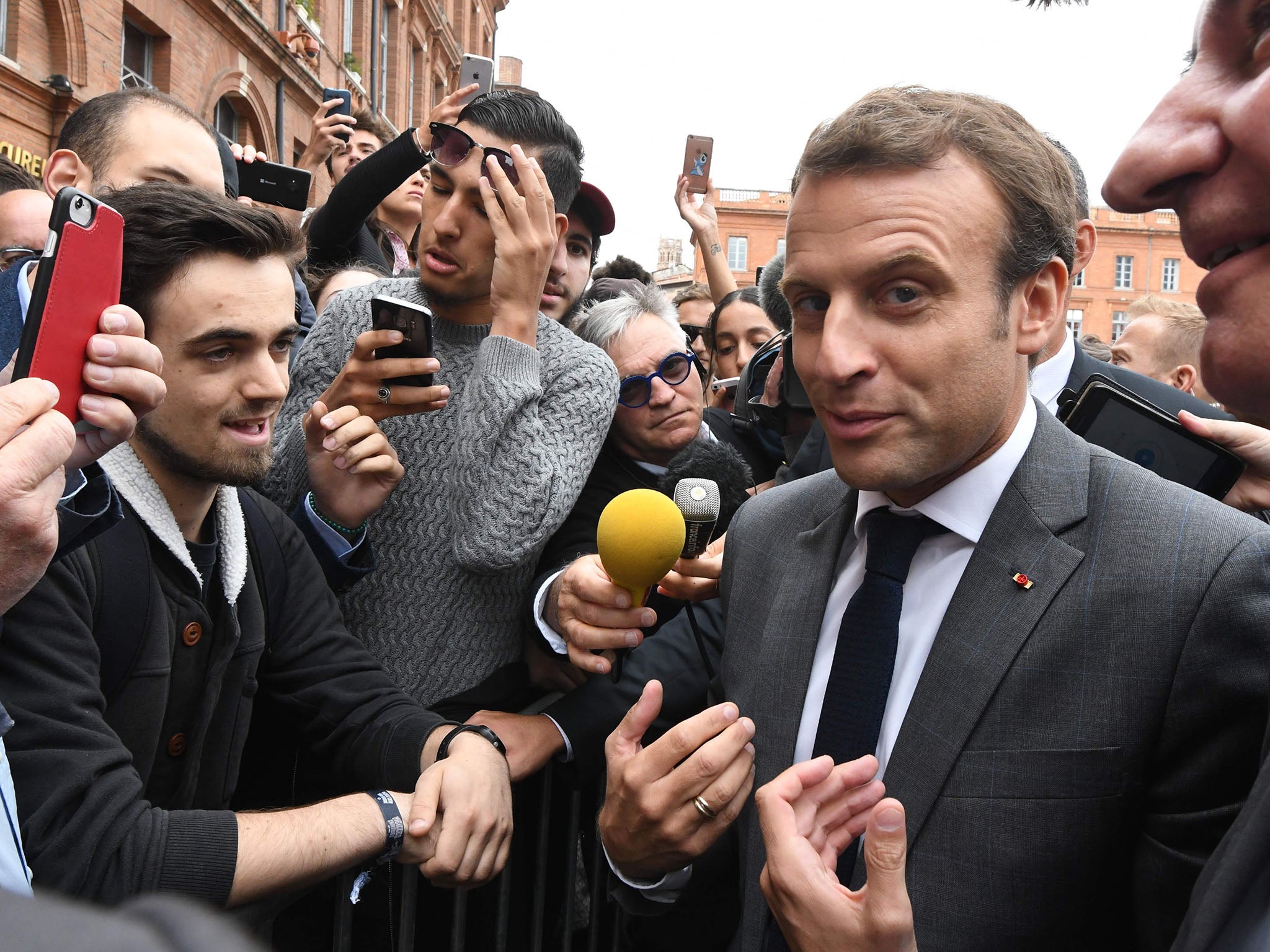Most French presidents have bowed to the power of employment protests – but Macron doesn’t seem that easy to scare
Surprisingly, only around 8 per cent of the French work force actually belongs to a union, but their influence remains vital. In France, this is invariably a euphemism for wide scale disturbances that often deteriorate into mayhem


“Black Tuesday” is the kind of ominous description being banded around by ambitious activists protesting against employment reform in France today. The expression became internationally famous in 1929 when the Wall Street Crash ushered in the Great Depression across the USA.
President Emmanuel Macron’s fledgling administration is nowhere near such a disaster, but effective street action is all about impact, and many believe that the so-far fantastically successful young pretender will finally get his comeuppance over the coming months. This is especially so after the conviction politician said his project would “not yield anything, either to the lazy, the cynics or the extremes” – words that infuriated thousands, not least of all those without jobs.
There is certainly a calm-before-the-storm atmosphere in Paris as some trade unionists urge unaffiliated workers and the unemployed to join them in a day of political agitation. Its main target is the way Macron has set about fulfilling his principal election pledge, which is to reduce a jobless rate currently hovering at just below 10 per cent. In some parts of the country, this figure spirals to 40 per cent for young people.
Macron intends to rush through a range of measures, including reducing tax and social charges on expanding businesses, so as to encourage them to take on more staff. There will be flexible contracts, making it easier for bosses to keep good workers, and fire bad ones. Ceilings on compensation for unfair dismissal will be applied. Crucially, firms will be able to hammer out pay and conditions agreements with local staff representatives, so bypassing the collective bargaining of national unions.
This, of course, is the main reason why many of the latter have pressed for today’s demonstrations against altering the complex compendium of regulatory texts known as the Code du Travail, or Work Code. Surprisingly, only around 8 per cent of the French work force actually belongs to a union, but their influence remains vital, especially in regards to direct opposition. In France, this is invariably a euphemism for wide-scale disturbances that often deteriorate into mayhem.
They work too. All recent presidents and their prime ministers have given in to people power, scrapping allegedly essential change following strikes or the first whiff of tear gas. In 1995, the transport system was brought to a standstill, along with everything from postal and health services, so leading to President Jacques Chirac withdrawing much-vaunted pension and other social security revamps. The movement behind the victory was compared to the fabled coalition of students and unionists that wanted a revolution in the spring of 1968, just as it was in 2006 when Chirac’s attempt at liberalising work contracts failed and caused weeks of fighting between riot squads and demonstrators.
The five years in office which ended in May for the socialist President François Hollande were also notable for periods of intense violence related to industrial strife, including potentially lethal attacks on police officers. A country focused on the threat of other forms of terrorism often underplayed the sheer ferocity of the crimes taking place within labour disputes.
Before this, the viciously divisive and repressive conservative Nicolas Sarkozy was known as “Le Top Cop” because of the way he quelled dissent with brutality. At one stage he even challenged a rude fisherman to a fistfight. Sarkozy was once laughably tipped as a radical reformer in the style of Margaret Thatcher, but soon revealed himself to be a reactionary pygmy obsessed with the super rich, including Carla Bruni, the multimillionaire heiress who became his third wife during his one-term presidency.
As Sarkozy’s career faltered and a string of financial sleaze scandals unfolded that could still see him imprisoned, the notion of a corrupt, do-nothing Paris political class provoked even more anger and dissatisfaction. Both Sarkozy and his former Prime Minister, François Fillon, are currently indicted criminal suspects, while the woman who came a distant second to Macron in May was the far-Right Front National firebrand, Marine Le Pen. Beyond her strong links with Nazi sympathisers and other racists, economic illiteracy characterised the Le Pen campaign, as did criminal investigations into her party. All of this further highlights the woeful inadequacies of this generation of French politicians.
In such circumstances, Macron has a chance to buck the trend. There is no sense of him being in politics to enrich himself. The idea that the former Rothschild banker is a ruthless agent of the global elite is fanciful too. Instead, Macron’s pragmatic approach to governance is reflected in his admission that “the French hate reform”, and indeed in the thoroughly non-ideological nature of his La République En Marche! party. Opinion polls showing a recent fall in popularity can mainly be attributed to l’ennui, the destructive boredom that grips the traditionally cynical French, especially during the long summer holiday.
Now we have reached la rentrée, the return to the serious business of life, when Macron will be expected to put his overwhelming parliamentary majority to good use. His country is by no means a basket case: European neighbours including Spain have far worse employment problems, and French companies are still among the best in the world, flourishing in countries such as Britain and America.
What is lacking is the kind of institutional overhaul that will allow capitalism to succeed domestically. This means reducing the size of the public sector, cutting red tape, strengthening the work ethic prevalent among the populations of international rivals… finally bringing France into the 21st century, in other words.
Macron is positioning himself as a pro-business centrist who can rebuild Europe at a time when it is facing numerous challenges, not least of all Brexit. He has warned that EU democracy is in danger, and that people need to be educated as to how shared values, and a rejection of conflict, can bring about prosperity for all.
Fierce, physical turmoil will of course be a novel and unwelcome test for Macron, but the idea that even a Blackish Tuesday will somehow signal irreversible doom is well wide of the mark.


Join our commenting forum
Join thought-provoking conversations, follow other Independent readers and see their replies